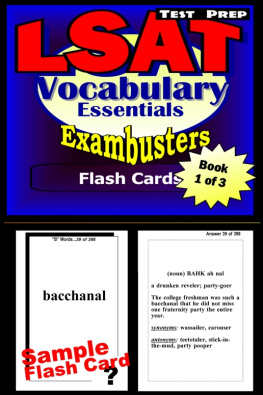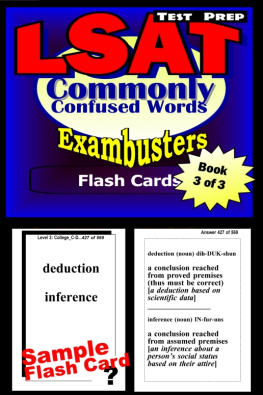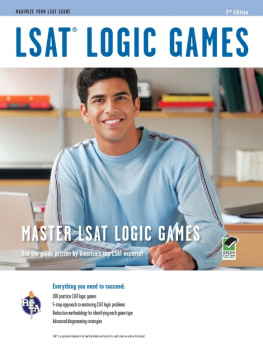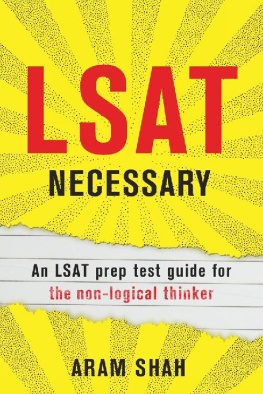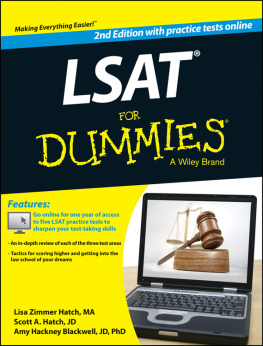101 Ways
to Score Higher
on Your LSAT

What You Need to Know About
the Law School Admission Test
Explained Simply
By Linda C. Ashar
101 Ways to Score Higher on Your LSAT: What You Need to Know About the Law Schoolt Admission Test Explained Simply
Copyright 2008 by Atlantic Publishing Group, Inc.
1405 SW 6th Ave. Ocala, Florida 34471 800-814-1132 352-622-1875Fax
Web site:
SAN Number: 268-1250
No part of this publication may be reproduced, stored in a retrieval system, or transmitted in any form or by any means, electronic, mechanical, photocopying, recording, scanning, or otherwise, except as permitted under Section 107 or 108 of the 1976 United States Copyright Act, without the prior written permission of the Publisher. Requests to the Publisher for permission should be sent to Atlantic Publishing Group, Inc., 1405 SW 6th Ave., Ocala, Florida 34471.
ISBN-13: 978-1-60138-253-5 ISBN-10: 1-60138-253-7
Library of Congress Cataloging-in-Publication Data
Ashar, Linda C., 1947
101 ways to score higher on your LSAT : what you need to know about the law school admission test explained simply / by Linda C. Ashar.
p. cm.
Includes bibliographical references and index.
ISBN-13: 978-1-60138-253-5 (alk. paper)
ISBN-10: 1-60138-253-7 (alk. paper)
1. Law schools--United States--Entrance examinations. 2. Law School Admission Test. I. Title. II. Title: One hundred one ways to score higher on your LSAT. III. Title: One hundred and one ways to score higher on your LSAT.
KF285.Z9A15 2008
340.076--dc22
20080356519
LIMIT OF LIABILITY/DISCLAIMER OF WARRANTY: The publisher and the author make no representations or warranties with respect to the accuracy or completeness of the contents of this work and specifically disclaim all warranties, including without limitation warranties of fitness for a particular purpose. No warranty may be created or extended by sales or promotional materials. The advice and strategies contained herein may not be suitable for every situation. This work is sold with the understanding that the publisher is not engaged in rendering legal, accounting, or other professional services. If professional assistance is required, the services of a competent professional should be sought. Neither the publisher nor the author shall be liable for damages arising herefrom. The fact that an organization or Web site is referred to in this work as a citation and/or a potential source of further information does not mean that the author or the publisher endorses the information the organization or Web site may provide or recommendations it may make. Further, readers should be aware that Internet Web sites listed in this work may have changed or disappeared between when this work was written and when it is read.

Dedication
To my husband Michael,
the best lawyer I know.

We recently lost our beloved pet Bear, who was not only our best and dearest friend but also the Vice President of Sunshine here at Atlantic Publishing. He did not receive a salary but worked tirelessly 24 hours a day to please his parents. Bear was a rescue dog that turned around and showered myself, my wife Sherri, his grandparents Jean, Bob and Nancy and every person and animal he met (maybe not rabbits) with friendship and love. He made a lot of people smile every day.
We wanted you to know that a portion of the profits of this book will be donated to The Humane Society of the United States.
Douglas & Sherri Brown

The human-animal bond is as old as human history. We cherish our animal companions for their unconditional affection and acceptance. We feel a thrill when we glimpse wild creatures in their natural habitat or in our own backyard.
Unfortunately, the human-animal bond has at times been weakened. Humans have exploited some animal species to the point of extinction.
The Humane Society of the United States makes a difference in the lives of animals here at home and worldwide. The HSUS is dedicated to creating a world where our relationship with animals is guided by compassion. We seek a truly humane society in which animals are respected for their intrinsic value, and where the human-animal bond is strong.
Want to help animals? We have plenty of suggestions. Adopt a pet from a local shelter, join The Humane Society and be a part of our work to help companion animals and wildlife. You will be funding our educational, legislative, investigative and outreach projects in the U.S. and across the globe.
Or perhaps youd like to make a memorial donation in honor of a pet, friend or relative? You can through our Kindred Spirits program. And if youd like to contribute in a more structured way, our Planned Giving Office has suggestions about estate planning, annuities, and even gifts of stock that avoid capital gains taxes.
Maybe you have land that you would like to preserve as a lasting habitat for wildlife. Our Wildlife Land Trust can help you. Perhaps the land you want to share is a backyardthats enough. Our Urban Wildlife Sanctuary Program will show you how to create a habitat for your wild neighbors.
So you see, its easy to help animals. And The HSUS is here to help.
The Humane Society of the United States
2100 L Street NW
Washington, DC 20037
202-452-1100
www.hsus.org
Courtroom Testimony: Attorney
Examining Witness
ATTORNEY: | Doctor, before you performed the autopsy, did you check for a pulse? |
WITNESS: | No. |
ATTORNEY: | Did you check for blood pressure? |
WITNESS: | No. |
ATTORNEY: | Did you check for breathing? |
WITNESS: | No |
ATTORNEY: | So, then it is possible that the patient was alive when you began the autopsy? |
WITNESS: | No. |
ATTORNEY: | How can you be so sure, Doctor? |
WITNESS: | Because his brain was sitting in a jar on my desk. |
ATTORNEY: | But could the patient have still been alive, nevertheless? |
WITNESS: | Yes, it is possible that he could have been alive and practicing law. |
From courtroom public records compiled in: Disorder in the Court: Great Fractured Moments in Courtroom History, by Charles M. Sevilla and Lee Lorenz, 1999, excerpt as quoted at www.cruiserjim.com/AmericanCourts.htm , March 1, 2008.

Table of Contents


